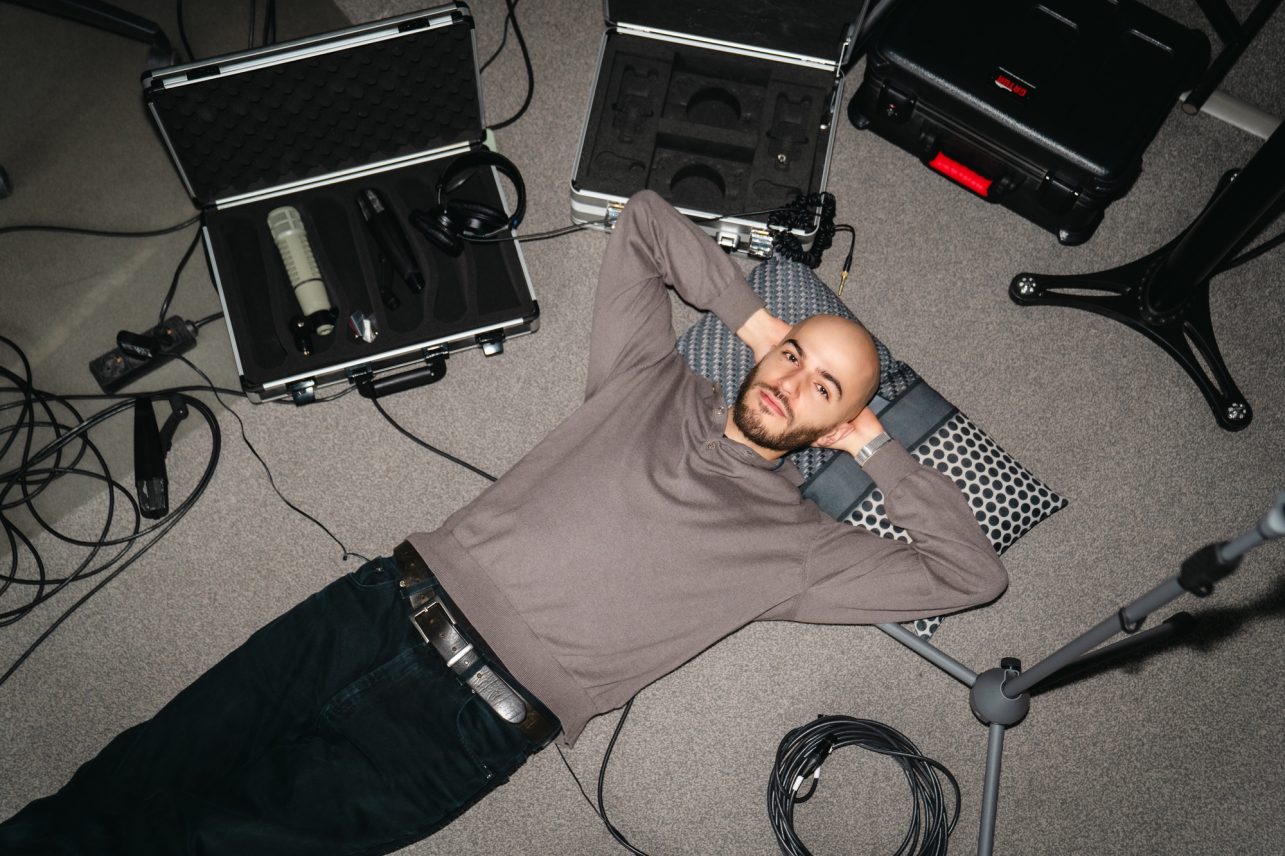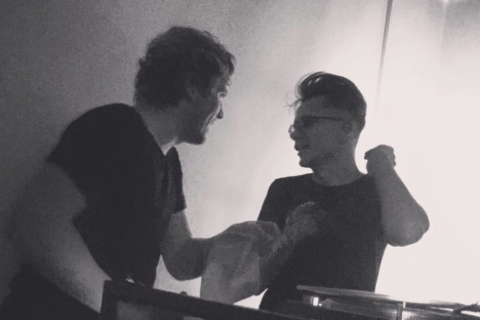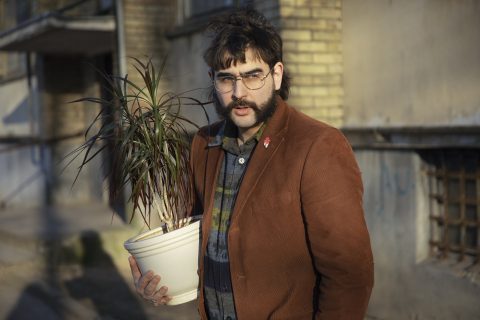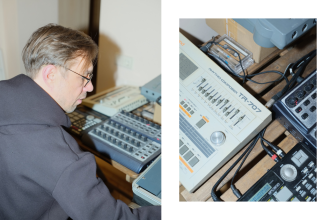A vivid memory from university days comes to mind: Kaunas University of Technology, the Faculty of Social Sciences, Humanities and Arts on A. Mickevičius Street, and a familiar face constantly seen in its hallways – music technology student Romuald Chaloin Galiauskas. As he himself once said, he is a person who is always searching for himself and thus always creating; someone who loves life, being with people, and enjoying other gifts of knowledge.
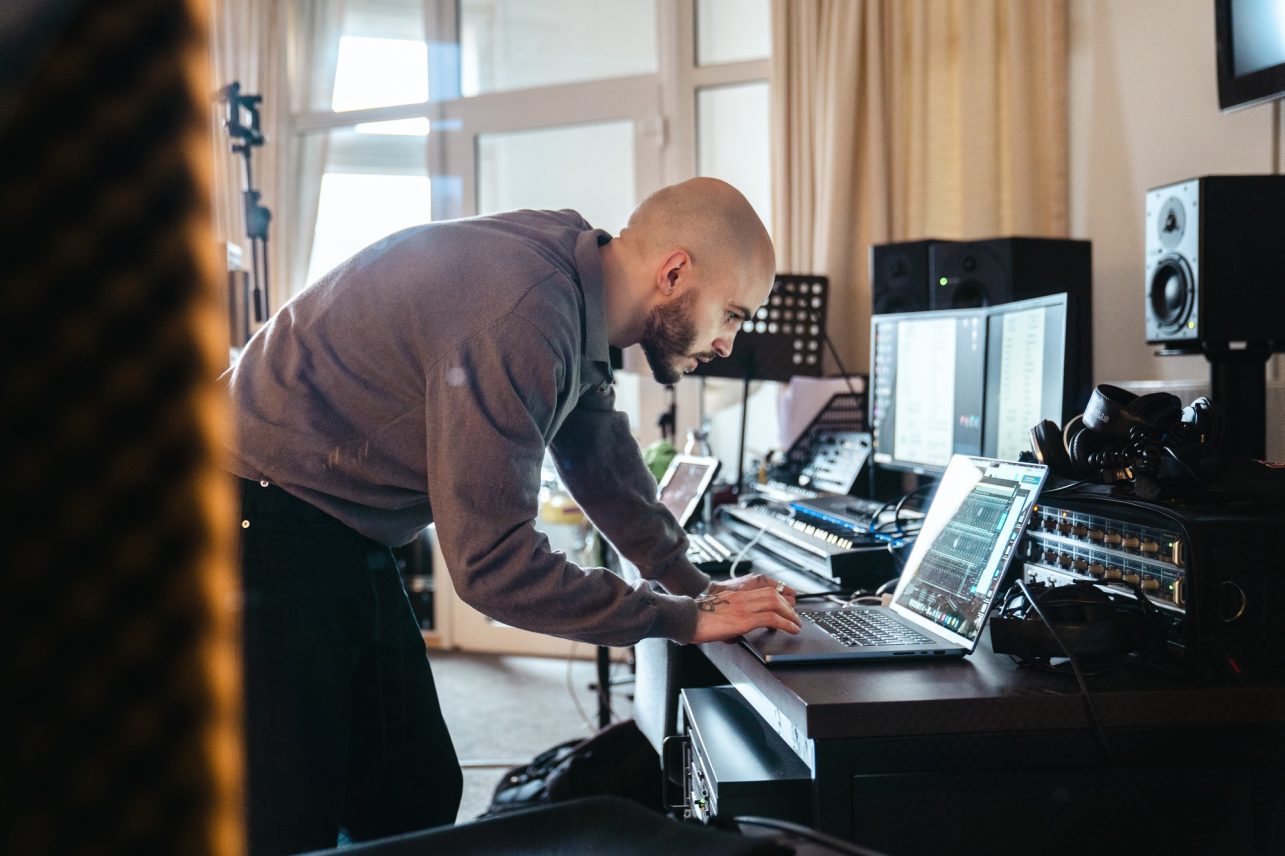
This French-Lithuanian composer and sound artist will soon be at Kaunas Artists’ House, where he will present his first album of algorithmic studies, Algoritmija, on 30 April. The album features compositions from the last three years, created for live instrumentation and computer. In March, I caught Romualdas remotely – he was at Teatro Colón in Bogotá, Colombia, preparing for the opera-performance Sun & Sea.
What connects you to France, Panevėžys, and Kaunas?
I was born in Lille, France. My mother, Joelle, is southern French, and my grandmother, Rachelle, is Moroccan – I guess that’s why I have such a strong addiction to the sun. On the other side of Europe, in the village of Katinai near Panevėžys, my father, Romas, grew up. My parents met while searching for themselves and volunteering at L’Arche, a center for people with disabilities in northern France. Later, when I was five, we moved to my dad’s homeland because my parents wanted to raise their children closer to nature. Growing up in that village, I felt somewhat isolated from kids my age, but today I’m really grateful for that environment.
I went to school in Panevėžys. It was at the Vytautas Mikalauskas Art Gymnasium that I was introduced to the world of music, where I learned to play the trumpet, although, to be honest, I still don’t really understand why I chose the trumpet. Anyway, all those twelve years at school, I was definitely surrounded by music, mainly classical. Since the trumpet was not close to my heart, I decided to look for other opportunities – that’s how I was introduced to the profession of a sound engineer. Without much thought, in 2015, I decided to enroll at Kaunas University of Technology – I chose to study Music Technology. Later on, I also studied electronic music composition and performance, and now I have been living in Kaunas for 10 years.
And how much are your parents involved in music or art?
I was very lucky to be born into a family that was both spiritually and aesthetically sensitive. My mother, Joelle Chaloin-Galiauskas, has a master’s degree in history of art and a PhD in cinematography from the Sorbonne University, and has taught theological interpretation of cinema at the Catholic Institute of Lille. Thanks to her, I was introduced to non-commercial cinema and the general context of world culture from an early age.
And my father, Romas Galiauskas, is a man of extraordinary depth. As a young man, he received a strong foundation in theology and philosophy while studying at Kaunas Theological Seminary. As he himself says, he didn’t enter the seminary out of a calling, but rather in search of answers to existential questions. He didn’t finish his studies in Kaunas, though, he decided to continue them in France. Later on, around his fifties, he began working with clay – it seems that in this “earthy” form of expression, he found his true calling.
I would also like to mention that my sister Eva, who is two years older than me, is also imbued with sensitivity and a desire to express herself. Her field of study is fine and visual arts. Sometimes I think that with parents like that, we had no choice [laughs].
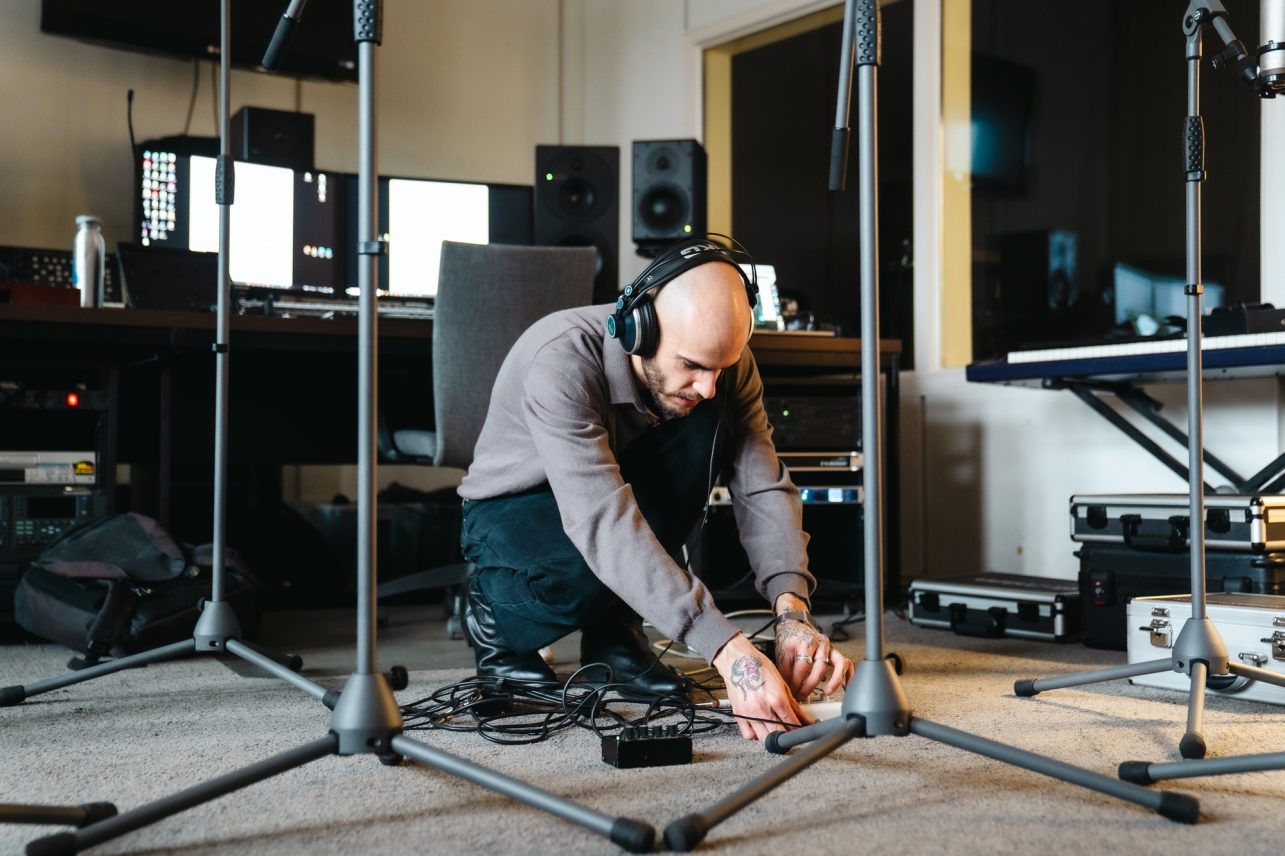
Your master’s degree broadened your knowledge and allowed you to work on sound projects not only as an engineer, but also as a creator. I wonder if you are demanding when it comes to recording? I read that your first serious composition was an hour-long soundtrack for the Ukrainian director Dziga Vertov’s film Man with the Movie Camera (1929) – you included flute, violin, French horn, and live electronics.
I don’t know if “demanding” is accurate – I’m probably trying to be more resourceful. I’m an unknown artist, I don’t have a lot of finances, so I have to organize recordings and concerts as simply as possible. This means writing simple scores that can be played almost on the first take, using the existing equipment and doing all the technical work myself. The beginning of a young creator’s journey is full of constant compromises, so I tend to avoid the word “demanding,” even though I really do try to stay as close as possible to my vision – paying a lot of attention to detail and striving to make the final result as high-quality as possible.
Romualdas, after your studies, you did an internship at the Paris Acoustics/Music Research and Coordination Institute. Tell us about your experience there and the key lessons you brought back with you to Kaunas.
I had an eye-opening experience there. The aim of the internship was to observe various productions at different stages, and the center’s core principle is this: up to a hundred scientists, computer scientists, acousticians, and similar engineers conduct research, develop software, and provide training.
Over the course of the year, around twenty selected composers are invited to realize their technically demanding compositions, each one is assigned a person who understands both music and computer science. Together, they search for tools to help achieve the desired sonic result. The essence of my internship was to observe this process. I spent quite a bit of time in studios, where composers and technicians were exploring sound and experimenting. Of course, I also participated in dress rehearsals and later in the actual concerts.
I came back from the internship having absorbed a lot of technical information and having a real understanding of the possibilities of various programs, the principles of collaboration between composer and technician, and the process of creating large and complex productions. The most tangible thing was the basics of the MAX-msp visual programming language. All the compositions I have performed or created in recent years have been made in one way or another using this program. It is possible to program a digital instrument that can respond live, without any delays, to incoming visual and audio information.
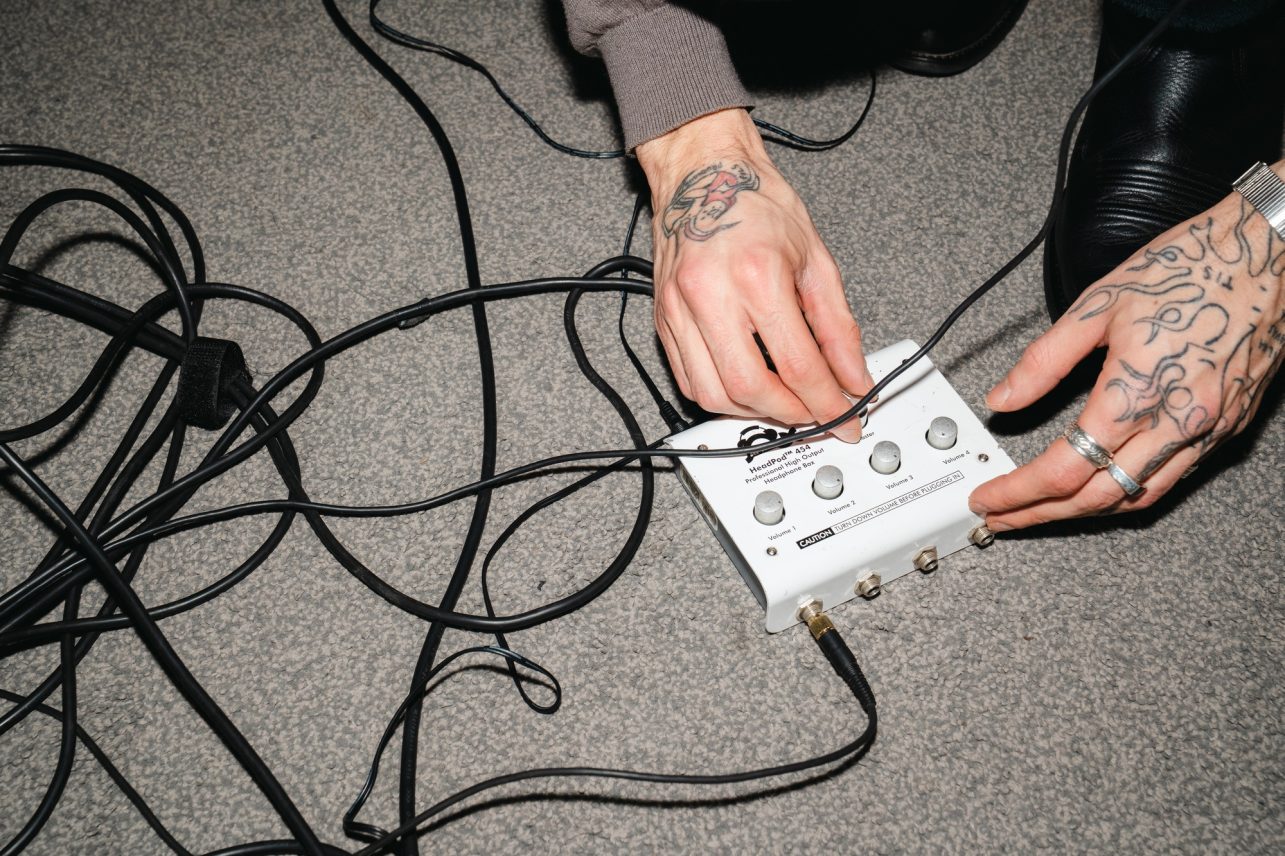
Let’s talk about the opera-performance Sun & Sea. How did you become the sound engineer for a performance that went on to win the Golden Lion at the Venice Biennale?
In my fourth year of undergraduate studies, I received an email offering the opportunity to do a graduation internship at the Venice Biennale, in the Lithuanian pavilion. I wasn’t the top-performing student, so I didn’t have high hopes, but I replied to the email anyway. At the time, I didn’t even know the name of the project. A few months later, my academic supervisor informed me that, besides me and one other third-year student, no one else had responded to the invitation, so the two of us soon signed the internship contract.
I did a three-month internship there, and it turned out that my graduate internship was none other than Sun & Sea. This internship changed my outlook on life. I realized that you can really make a living out of creativity, I met a lot of wonderful people, I experienced a wide range of emotions, and I realized that I could work as a sound engineer even in quite complex projects. In short, it couldn’t have been a better challenge for me right after my studies.
Tell us about your own creative processes. They seem very diverse: collaborations with the Kaunas Artists’ House and your friend Fiorini (concert at Kiras café), re/FABRIKacija, TAKSI. Attempts to overcome distances, music compositions for the puppet theatre performance Aš – žvėris (I Am a Beast).
Diversity comes from a desire to explore different creative methods. Creating alone is truly dear and close to my heart, but when others join the process, the piece somehow feels more complete. While working on a soundtrack for a silent film, I realized that I want to create sound for visuals. That’s why I’m always excited about opportunities to compose music for performances or theater.
If you could perform your music anywhere in Kaunas, which place, or venue would you choose?
Žalgiris Arena. Just kidding. To tell you the truth, I haven’t thought about it, but I’m insanely grateful to the Kaunas Artists’ House for giving me the opportunity to perform there – I probably don’t need anything more. And from a conceptual and emotional point of view, I would say the Britanika Hotel. Because of its monumentality and temporary nature, it will be demolished at some point, so I hope I will still be able to perform there before it’s gone.
